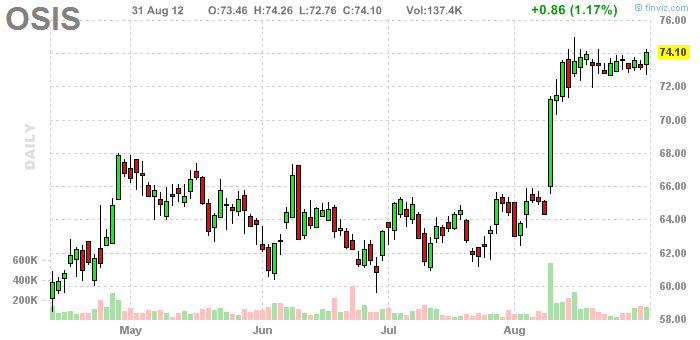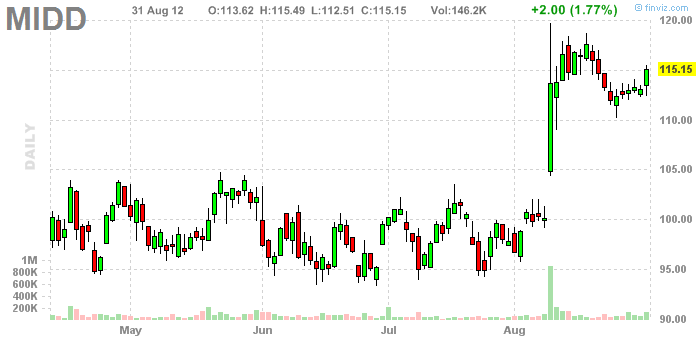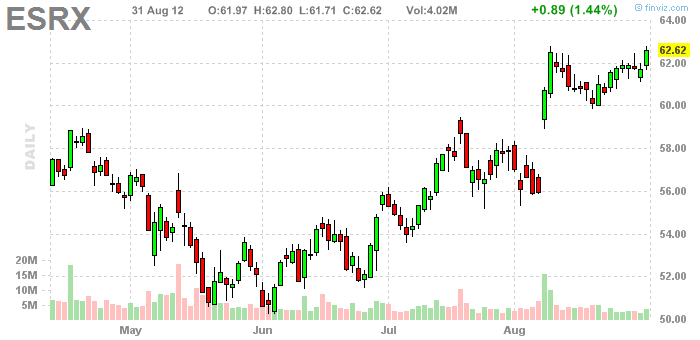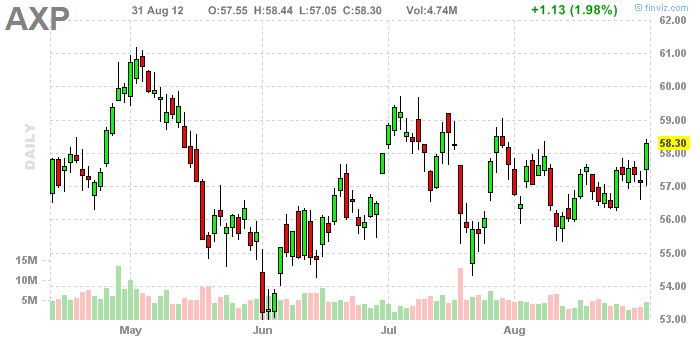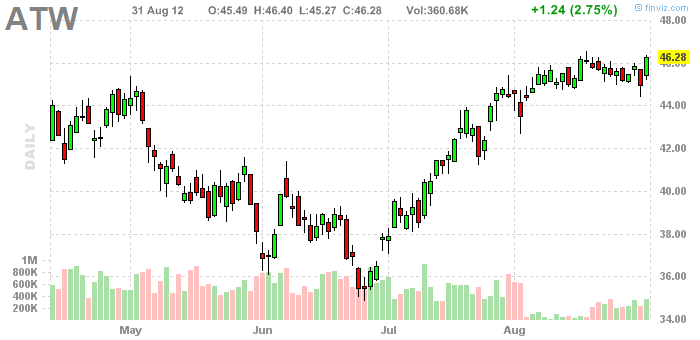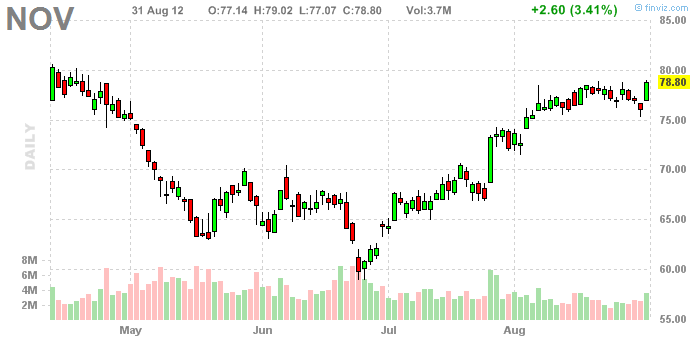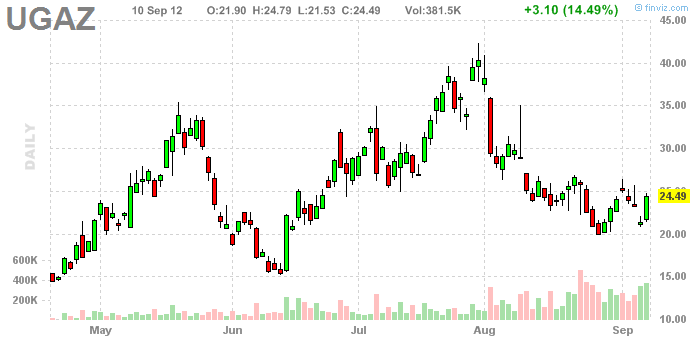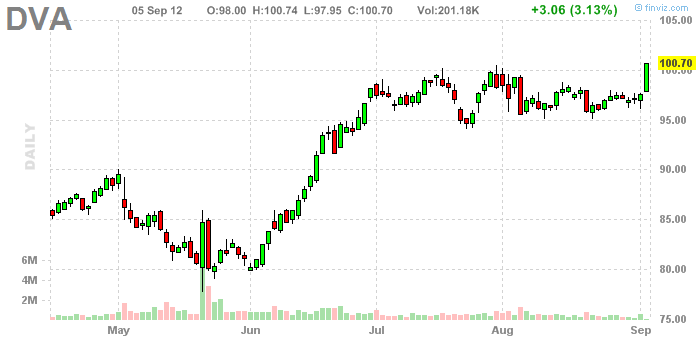lunes, 29 de octubre de 2012
Earn IMF leads global push for euro zone to boost firewall
Oil Greece, creditors laboriously piece together debt deal
sábado, 27 de octubre de 2012
Signals AAPL was story of the day
Now all eyes are on Fed and that will be next big catalyst for the market.
On the ETF front one of the ETF worth looking at is UGAZ . It is trying to bounce back after a pullback. The natural gas futures were up 5% yesterday. If it gets going it might take out previous high near 40.
jueves, 25 de octubre de 2012
Signals SEC probes exchanges and electronic trading firms ties
miércoles, 24 de octubre de 2012
Oil PPLT had a big eversal
martes, 23 de octubre de 2012
Earn BlackRock to Buy ETF firm Claymore
lunes, 22 de octubre de 2012
Oil End of day fade
The underlying breadth is good , but a little more conviction is needed. The action on individual stocks looks attractive. Number of them are breaking out on good volume. The oil and gas stocks have had best month or so .
The international market ETF have found a bid and many of them had huge moves in last 5 days.
domingo, 21 de octubre de 2012
Oil LDSI - Turning Higher?
LDSI has been in a tremendous tailspin the last two months. The stock has seen a bevy of selling bring the stock to fresh new lows for the year.
However the last two trading session reveal a stock that may be starting to turn higher. Today and Friday the stock was able to over comb selling pressure and post gains. Today we had strong buying volume and the stock looks poised to break out of its two month slump.
The stock was over $.07 last month and closed today at $.0031. We could see a sharp rally out of these oversold conditions.
Backstage Vibe(TM) Testing Features and Functionality
Marketwire 'Press Releases'
Backstage Vibe™ (PINKSHEETS: LDSI) has created an incredibly creative and groundbreaking web platform for artists, their adoring fans, music promoters and producers. The company is currently testing all of the features and functionality to ensure that customers can't resist coming back after their initial experience.
Backstage Vibe™ promises the ultimate social music experience and has provided screenshots to showcase the streamlined and powerful functionality. The online store enables artists, music labels, and others to present and sell their products and services. The web platform provides artists with an option to create their own personal store open to the community that then feeds into a larger store open to the public.
Another exciting feature is the incorporation of SoundCloud, which will serve as an incredible resource for music integration and critical feedback, facilitate collaboration and provide ease of sales. Backstage Vibe™ will also offer a file sharing feature that will accommodate professional audio software file formats (such as ProTools files) to further optimize artists' and bands' ability to collaborate at a professional level.
These are but a few of the features and functionality already built into the web platform. As you can see from the screenshots, Backstage Vibe™ is providing artists the tools to chart their own course, whether it's promoting their art, collaborating with other artists or selling their music, goods and services.
Artists, producers, promoters, fans, and music aficionados can pre-register for the innovative social music site at www.BackstageVibes.com. Pre-registrants will receive 2 months of the service FREE when the full site goes live.
About
Image Available: http://www2.marketwire.com/mw/frame_mw?attachid=2070780
CONTACT:Life Design Station International, Inc.
info@backstagevibes.com
Source:
jueves, 18 de octubre de 2012
Oil UYMG Issues Impressive News Today
'Our authorized share count has risen this year to account for our transition into On Track Technology becoming our main subsidiary. We will not be raising the Authorized share count any further while we control/own UYMG,' said Michael Oliver president of Unity Management group Inc. He went on to add that our valuation or market capitalization is very low for the nature of what we are trying to accomplish. Our valuation is that of many OTC Market shell companies at this time. We are not a shell and have many results, announcements, and filings coming, that will yield a higher value immediately as traders and investors participate in the trading of our stock. We are looking for millions of dollars of value and business here, not 10s of thousands or hundreds of thousands.
Might not be a bad time to take a closer look at UYMG. I think the stock heads back over $.002 this week... but what do I know?
EAST HANOVER, N.J., Sept. 4, 2012 /PRNewswire via COMTEX/ -- Unity Management Group (OTC Pink:
martes, 16 de octubre de 2012
Earn BBDA Hits New Highs - Continues its 2 Month Long Rally
I don't like to revisit a stock on a daily basis, but BBDA continues to give me a reason to write about them. The stock sat at $.0003 a little over two months ago (its 52 week low) and hit a high today of .0172 today. If you bought $1,000 of BBDA stock at the $.0003 price, today those shares were worth $57,333 at the high. If you bought $1,000 of BBDA stock when I alerted it my subscribers at $.0003/.0004, they were worth $43,000 at the high today. Just a great rally and just when you think its going to stop, it picks right back up and heads to new highs.
http://pennystockgurus.blogspot.com/2012/08/bbda-stock-soars-from-00030004-to-0144.html
http://pennystockgurus.blogspot.com/2012/08/bbda-stock-hits-01-share.html
http://pennystockgurus.blogspot.com/2012/08/bbda-hit-0119-share-from-0003-alert.html
lunes, 15 de octubre de 2012
Earn Utilities to see profit increases in 2012
Oil Fitch cuts Italy, Spain, other euro zone ratings
domingo, 14 de octubre de 2012
sábado, 13 de octubre de 2012
Forex Obama seeks power to merge agencies
sábado, 22 de septiembre de 2012
Forex Global economy on recovery path, risks remain: IMF chief
miércoles, 19 de septiembre de 2012
Forex Airbus expects years of grappling with A380 cracks
martes, 18 de septiembre de 2012
Forex Rate on 30-year mortgage drops to record 3.89 pct.
Newly built luxury townhomes are offered for sale in Woodland Hills, Calif. Tuesday, Jan. 10, 2012. Fixed mortgage rates hit yet another record low on the second week of the new year. But the cheap rates are expected to do little to boost the depressed housing market. (AP Photo/Damian Dovarganes) Newly built luxury townhomes are offered for sale in Woodland Hills, Calif. Tuesday, Jan. 10, 2012. Fixed mortgage rates hit yet another record low on the second week of the new year. But the cheap rates are expected to do little to boost the depressed housing market. (AP Photo/Damian Dovarganes) WASHINGTON (AP) -- Fixed mortgage rates fell once again to a record low, offering a great opportunity for those who can afford to buy or refinance homes. But few are able to take advantage of the historic rates. Freddie Mac said Thursday the average rate on the 30-year fixed mortgage fell to 3.89 percent. That's below the previous record of 3.91 percent reached three weeks ago. Records for mortgage rates date back to the 1950s. The average on the 15-year fixed mortgage ticked down to 3.16 percent. That's down from a record 3.21 percent three weeks ago. Mortgage rates are lower because they track the yield on the 10-year Treasury note, which fell below 2 percent. They could fall even lower this year if the Fed launches another round of bond purchases, as some economists expect. [Click here to check home loan rates in your area.] Average fixed mortgage rates hovered around 4 percent at the end of 2011. Yet many Americans either can't take advantage of the rates or have already done so. High unemployment and scant wage gains have made it harder for many people to qualify for loans. Many don't want to sink money into a home that they fear could lose value over the next few years. Mortgage applications have fallen slightly on a seasonally adjusted basis over the past four weeks, according to the Mortgage Bankers Association. Frank Nothaft, Freddie Mac's chief economist, said that until hiring picks up and unemployment drops significantly, the impact of lower mortgage rates will remain muted. Previously occupied homes are selling just slightly ahead of 2010's dismal pace. New-home sales in 2011 will likely be the worst year on records going back half a century. Builders hope that the low rates could boost sales next year. Low mortgage rates were cited as a key reason the National Association of Home Builders survey of builder sentiment rose in December to its highest level in more than a year. But so far, they have had little impact on the depressed housing market. To calculate the average rates, Freddie Mac surveys lenders across the country Monday through Wednesday of each week. The average rates don't include extra fees, known as points, which most borrowers must pay to get the lowest rates. One point equals 1 percent of the loan amount. The average fee for the 30-year loan fell to 0.7 from 0.8; the average on the 15-year fixed mortgage was unchanged at 0.8. For the five-year adjustable loan, the average rate declined to 2.82 percent from 2.86 percent. The average on the one-year adjustable loan fell to 2.76 percent from 2.80 percent. The average fee on the five-year adjustable loan rose was unchanged at 0.7; the average on the one-year adjustable-rate loan was unchanged at 0.6.
martes, 11 de septiembre de 2012
Earn Stock Market for 10/12/12
Oil Swing trading opportunities
